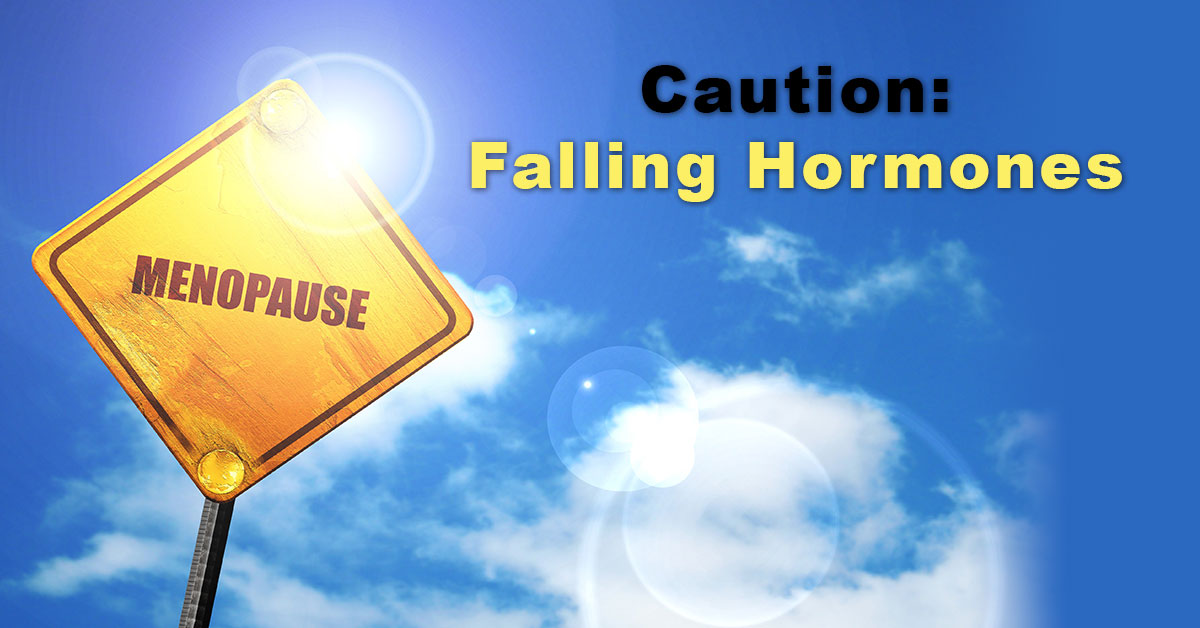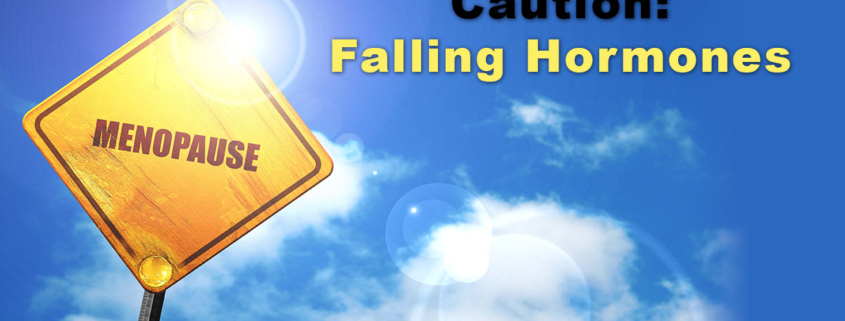MENOPAUSE HORMONES – Caution: Falling Hormones

Your ovaries begin to age and as your years go up, your hormones go down. These inevitable changes in your hormones and natural decline of estrogen levels during menopause can significantly affect your health for years to come.
If You Could Change the Change
Estrogen depletion can bring on a combination of hormonal and biochemical fluctuations that can lead to changes in your brain and nervous system. You may experience mood swings, memory loss, problems focusing, irritability, fatigue, hot flashes, night sweats, stress, anxiety and depression. (Some researchers believe that estrogen depletion can affect your memory in a way that can impact your risk for the development of Alzheimer’s disease.) Due to estrogen depletion, women are also put at an increased risk for cardiovascular issues, such as heart attacks, strokes, or other heart-related problems. After the age of 30, the creation of new bone cannot keep up with the rate of bone loss in your body. The estrogen depletion that comes with menopause results in an increased risk for low bone mineral density, osteopenia and osteoporosis. For 5-10 years after menopause, this bone density loss accelerates into a gradual weakening of your bones and can lead to an increase in the risk for fractures and other injuries. (Gimme a break.)
Hit or Myth
Myth #1: Menopause begins at 50
Menopause begins at 50…or at 42…or 36…or 61. The average woman begins menopause at 52, but you may start your transition anywhere from your 30’s to your 60’s.
Myth #2: Weight gain is inevitable in menopause
Weight gain is an absolute in menopause but you don’t have to allow it.
Myth #3: There’s no difference between natural menopause and “surgical” menopause
It’s critical for women to know that natural menopause and surgical menopause are indeed very different. When a woman undergoes a total surgical hysterectomy, she experiences an immediate and significant change in hormonal balance, literally overnight, instead of the slower transition of natural menopause.
Myth #4: The first sign of menopause is hot flashes
Despite the fact that menopause and hot flashes are almost synonymous in peoples’ minds, (and are also the topic of endless, tasteless jokes,) your first sign of menopause could be any of these symptoms:
- Fatigue
- Anxiety
- Irregular periods
- Irritability
- Mood swings
- Depression
- Anxiety
- Weight gain
- Hair loss
- Cravings
- Fuzzy thinking
- Low libido
- Forgetfulness
- Heavy menses
Myth #5: After menopause, your body doesn’t produce hormones
No cold turkey, empty bucket, here…
Myth #6: The older you are when you get your period, the older you’ll be when you go through menopause
For many women, just the opposite is true.
Myth #7: Menopause only causes physical symptoms
Could you describe yourself as a “raving maniac” at times? Are you more irritable and anxious? You’re not alone. Many women experience unnerving changes in their emotions, memory, and concentration during perimenopause and menopause due to sudden shifts in estrogen levels.
Some Hot Flashes About Sex.
Send up the balloons…your vagina is NOT going to shrivel up like a prune. Your libido isn’t going on permanent leave. You can still get hot and we’re not referring to flashes. Your desire isn’t headed to the dumps. The vagina is a “use it or lose it” place, the act of intercourse stimulating blood flow to keep it healthy. Media makes it sound gross to have sex after 50. It’s beyond Millennial imagination. (Hint: they’ll get there before they know it.) So, ok, you might not feel as sexy as before. Tip: up the intimacy. Go for as many orgasms as you can get. Why not? You just might have to work a little harder for it. Yes, you might be a little drier, but bring on the lubes. There are tons of them. And consider this; no tampon, pads, IUD’s. No kids doing anything interruptus. Enjoy. Probably even more.
Pause to Hear This
When it comes to menopause, there are many types of estrogen replacement you might hear of: pills, patches, creams, suppositories and more. None work as well as bioidentical hormones. It’s important to know the difference between bioidentical hormones and synthetic ones. Natural or bioidentical hormones are hormones made from a natural substance and are bio-chemically identical to human hormones. Synthetic hormones are not derived from a natural substance and not biochemically identical. Synthetic hormones were created by pharmaceutical companies in an attempt to mimic the effects of natural female hormones. Which creates huge differences in both efficacy and side effects. The most important thing to know is who to go to, to get the professional help you really need. Write this name down, right now: Stephen A. Goldstein MD, F.A.C.S. at Denver Hormone Health. With years of expertise and experience treating hundreds of perimenopausal and menopausal women, he is among one of few extensively educated and knowledgeable in BHRT specialists in the Denver area. You’ll begin to feel relief the moment you meet with him. He takes the time to listen and to talk about your individual symptoms and issues. Next, he does simple tests that tell him your estrogen levels. At which point he creates an integrated plan of hormones, healthy eating and exercise that will restore not just your estrogen, but what you need to feel as energetic and alive as you used to.
And be sure to keep the conversation going throughout your menopausal years.



